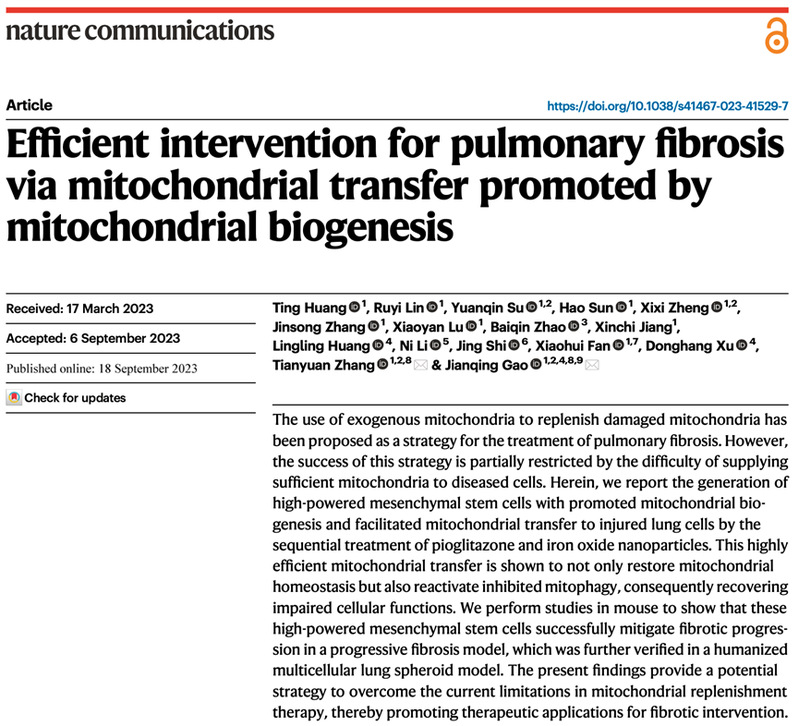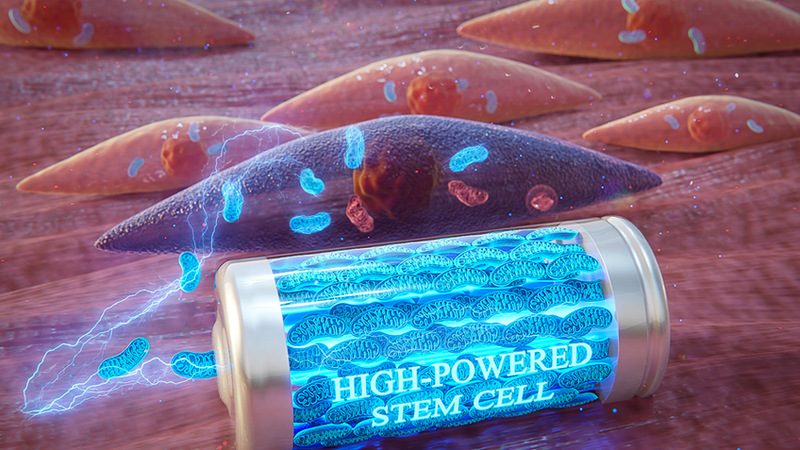High-powered MSC (V2.0)! Research from ZJU-CPS has been published on Nature Communications as Featured Article
2023-10-09 | 药学院英文网
On September 18th 2023, the team of Professor Jianqing Gao and Researcher Tianyuan Zhangfrom the College of Pharmaceutical Sciences at Zhejiang University, published a paper titled "Efficient intervention for pulmonary fibrosis via mitochondrial transfer promoted by mitochondrial biogenesis" in Nature Communications, which has been selected as one of the Featured Articles by editors of Nature Communications recently. The team employed MSC (Mesenchymal stem cell) facilitated by iron oxide nanoparticles to strcture the first version of "high-powered MSC"(V1.0). Iron oxide nanoparticles helps replenish mitocondria to cure the impaired pulmonary cells efficiently by promoting the high-expression of the connexin in MSC. But due to the low energy demand of undifferentiated MSC, the quantity of its exportable mitochondia is restricted, thus putting an end to this sort of mitochondrial transfer within a short period of time for that the mitochondria inside MSC have been exausted, which defeats the continuous and efficient mitochondrial delivery to the impaired cells. To tackle this problem, the team developed the second version of "high-powered MSC"(V2.0) via further engineering transformation for MSC, improving MSC's mitochondrial "capacity" and "exporting efficiency" simultaneously, thus achieving the continuous and efficient mitochondrial "recharge" of targeted impaired pulmonary cells.

The use of exogenous mitochondria to replenish damaged mitochondria has been proposed as a strategy for the treatment of pulmonary fibrosis. However,the success of this strategy is partially restricted by the difficulty of supplying sufficient mitochondria to diseased cells. Herein, we report the generation of high-powered mesenchymal stem cells with promoted mitochondrial biogenesis and facilitated mitochondrial transfer to injured lung cells by the sequential treatment of pioglitazone and iron oxide nanoparticles. This highly efficient mitochondrial transfer is shown to not only restore mitochondrial homeostasis but also reactivate inhibited mitophagy,consequently recovering impaired cellular functions. We perform studies in mouse to show that these high-powered mesenchymal stem cells successfully mitigate fibrotic progression in a progressive fibrosis model, which was further verifted in a humanized multicellular lung spheroid model. The present findings provide a potential strategy to overcome the current limitations in mitochondrial replenishment therapy, thereby promoting therapeutic applications for fibrotic intervention.


More information: Ting Huang, Ph.D candidates, is the first author. Professor Jianqing Gao and Researcher Tianyuan Zhang are the co-corresponding authors. The research also gets support from Department of Thoratic Surgery and Pharmacy, Second Affiliated Hospital of Zhejiang University School of Medicine, and from Professor Xiaohui Fan's team from Innovation Center of Yangtze River Delta, Zhejiang University.
Link: https://www.nature.com/ncomms/editorshighlights
Translator: Zihao Liu
Editor: Yichen Zhu
NEWS
-
10
2025.12
-
27
2025.11
-
25
2025.11
-
03
2025.11
-
30
2025.10
-
29
2025.10
